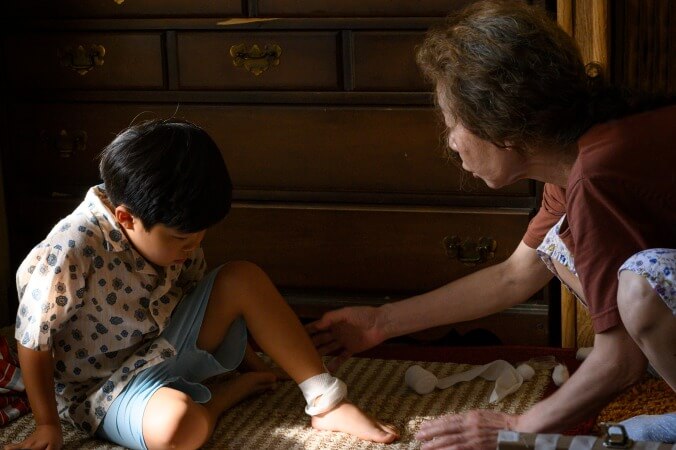Steven Yeun is a family man chasing the American dream in the soulful if lopsided Minari

“Daddy’s going to make a big garden,” announces Jacob (Steven Yeun) as his bewildered wife and wide-eyed children take in their unusual new surroundings: lush grassy plains, beautiful but unnervingly secluded. Their home has wheels and they dispose of trash by burning it. Compared to their lives in California, this is a spartan existence, but it’s a sacrifice Jacob is willing to make in his pursuit of the American Dream—a dream that often clashes with the realities of raising a family and maintaining a happy marriage.
Loosely based on writer/director Lee Isaac Chung’s childhood living on a farm in rural Arkansas, Minari is that rare slice-of-life drama that contains multitudes without needing to look beyond the borders of its highly specific story. The tale of a Korean-American farming family struggling to work through the growing pains of a new living arrangement that pushes their boundaries of comfort and familiarity, Chung’s tender and deeply considered debut avoids the treacly, redemptive formulas of immigrant dramas that center the resilience of its characters against the scourge of racism. Rather, Chung’s intimate if occasionally lopsided portrait of the immigrant experience peels back the layers of a family unit under threat of collapse.
The film’s central conflict is introduced almost immediately when Jacob, admiring the rich brown hue of his property’s soil, declares that he chose their new home based on the promising color of the dirt. His wife, Monica (Yeri Han), stares at her husband in scowling disbelief: They’re living in the middle-of-nowhere because of the dirt? Monica longs for a sense of community, and worries that her husband’s harebrained scheme will wash away their life’s savings. Chung’s script spells out, rather bluntly, each individual’s underlying motivations. In the first of the couple’s many arguments, Jacob announces his obligations as his family’s eldest son, and his own regrets about the time he’s wasted as a chicken sexer with no promise of upwards mobility. He insists that risk is necessary to improve their situation. Yet the question of their small son, David (Alan Kim), and his heart condition leaves the patriarch silent. Living so far from the nearest hospital keeps everyone on edge.
Chicken sexing involves sorting female chicks from the male ones. The latter group is considered useless and discarded by unsavory means, Jacob explains to his youngest. A commentary on the demasculinization of Asian men in Western countries, this theme underscores the personal hang ups of both father and son. In a huff, David insists he’s “good-looking,” not “cute.” Because of his medical problems, the 7-year-old is deprived of a normal childhood: For one, running is strictly forbidden. Yeun’s gruff but loving Jacob, the quintessential Asian father, is driven by a mixture of hubris and idealism. He’s sick of the low-wage jobs he’s been forced to work, and sees the farm as not just an opportunity to lift up his family, but to make something of himself and justify moving to America a decade earlier. Many come to this country in search of a better life, but who can say they’ve found it? Yeun, who famously worked with a language coach to iron out his accent in his last Korean-speaking role (Burning), here takes on a new challenge: speaking English in a Korean accent. The actor grasps the cadences of a non-native speaker, but his American accent routinely pokes through and shatters the illusion. Still, Yeun conveys his character’s insecurities and frustrations with a rigid intensity and light air of mystery.
The mood changes for the better when grandma Soon-ja (a magnetic Youn Yuh-jung) arrives, distracting the children from their increasingly dour parents, spiking the film with whimsy and humor. David, skeptical of the sassy old woman and her “Korean smell,” complains that she’s not a “real” grandma. Instead of baking cookies, the foul-mouthed Soon-ja watches wrestling and concocts unpalatable Korean herbal drinks that David is forced to drink. Native English speakers, David and his sister Anne (Noel Cho) are fully Americanized and appear to push back against their Korean roots that their grandma embodies. But eventually, David warms up to his eccentric companion. When she encourages his adventuring, he realizes she may be the only one that treats him like a proper, able-bodied 7-year-old.
Chung orchestrates what feels like an endless supply of observations and insights into the Korean-American experience, which makes Minari’s midsection at times feel like a series of vignettes. Some of these threads remain woefully unexplored: The emotional toll of Ellen’s position as the eldest, female child in a working class family of immigrants is hinted at, for instance, but ultimately cut short. That the film primarily takes David’s perspective perhaps justifies this fragmentation, though centering on the precious child allows the film to glide by on an occasionally unearned sentimentality. It also pulls away from the power of Chung’s otherwise omniscient storytelling.
Chung doesn’t give us a conventional happy ending, and Minari is all the better for it. We don’t see the full consequences of a fiery finale, yet this moment of crisis draws out the best in our characters, who place love before blame and choose unity over the concerns of any one individual. Minari, an imported Korean herb that thrives in a nearby creek, is the film’s spiritual totem; sprawling and resilient, it embodies the qualities needed to make a home from the toughest conditions, the compromises required to keep a family afloat.